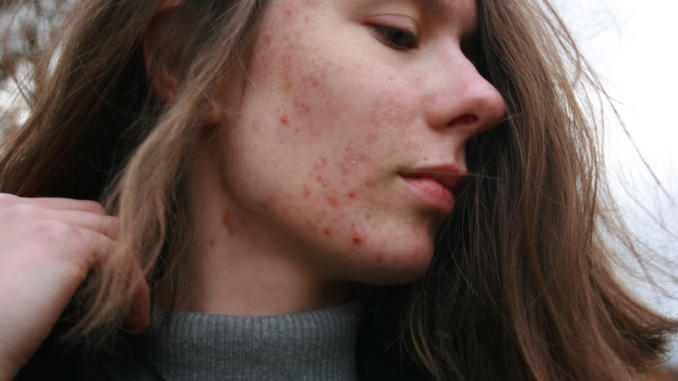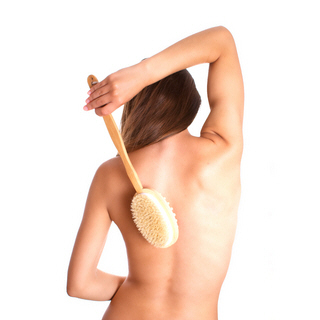
by Toby Patrick

Acne is one of the most common skin conditions and affects around 9% of the world’s population. It occurs when hair follicles become clogged with oil and bacteria and results in spots and pimples.
Acne symptoms can range from mild to severe, and the necessary treatment may depend on the severity of your acne. It’s worth noting that there is no permanent cure for acne, but that doesn’t mean there aren’t solutions to help you fight acne. This article will explore the causes and solutions to acne-prone skin.
Causes of Acne
In short, acne is caused by blocked pores. A common misconception is that this is always a result of poor hygiene. While improving your daily hygiene may be the solution for your acne-prone skin, this isn’t always true. Here are some of the most common causes of acne.
Hormonal Changes
You may experience acne when going through things like pregnancy and the menopause. Events like these can trigger hormonal changes that lead to an increase in our body’s production of sebum.
Poor Diet
Another common cause of acne can be dietary choices as food can also impact hormones. Research suggests that foods that are high in oil, fat or sugar are more likely to lead to breakouts.
On the flip side, foods that should help fight acne include fresh fruit and foods high in vitamin C.
Hereditary
Unfortunately for some, acne-prone skin can run in the family. Genetics can impact hair follicles and hormone levels which both play a crucial role when it comes to breakouts and acne. As a result, if your parents suffer from acne-prone skin, you’re also more likely to suffer from acne.
Cosmetic Products
It’s also important to consider any products that you are applying to your skin. One of the biggest causes of acne breakouts is cosmetic products that contain harmful chemicals or other substances that clog pores. These products are known as comedogenic products and should be avoided if you suffer from acne-prone skin.
Excessive Sweating
Sweat can lead to acne as it can easily be trapped in pores and trap debris. Excessive sweating can be caused by conditions such as hyperhidrosis or as a result of exercise. Regardless of your reason for producing sweat, it’s important to cleanse your skin after excessive sweating.
Solutions to Acne-prone Skin
Daily hygiene
The most obvious solution to acne-prone skin is to improve your daily skincare routine. Regular face scrubbing, washing and cleansing can help remove anything from your face that could potentially clog pores if left untreated.
If you regularly wear makeup or sunscreen, ensure you have a consistent daily facial routine that is carried out in the morning and before you go to sleep at night.
Isotretinoin
Isotretinoin capsules, or Roaccutane, are one of the most common treatments for severe acne. They work by limiting the production of sebum, which subsequently prevents pores from becoming blocked and breakouts occurring.
Due to the many side effects of Isotretinoin, including dry skin, mood changes and nausea, it’s recommended to use other solutions if your acne is only mild.
Antibiotics
Using antibiotics as an acne solution is a common starting point for many people when it comes to the fight against acne. Antibiotics can be used to target bacteria that cause acne. Common antibiotics that are used to combat acne include Tetracyclines, Erythromycin, Trimethropim, and Cotrimoxazole.
Microneedling
A more modern solution to acne is microneedling, which works by creating tiny punctures in the skin to stimulate healing. Microneedling can assist acne sufferers in several ways. Firstly, it can be used to treat enlarged pores which is one of the main causes of acne.
Secondly, microneedling can be used to treat scars that are left behind after successfully treating acne by stimulating the production of collagen which can help leave skin feeling rejuvenated.
Final Thoughts
It’s important to consider that there’s no quick fix for permanently solving acne. Instead, you’ll need to first find out what solution works for you and then be committed to staying on top of your acne-prone skin. It may be as simple as not using certain products, or you may need regular microneedling to prevent your acne from flaring up again.
You’ll also need to consider that finding a permanent solution to acne may leave you with unwanted scars. If your acne scars are severe, you could explore a deep plane facelift or other plastic surgery options to help with noticeable scarring. Finally, if you have already tried the solutions mentioned, consider reaching out to a dermatologist for personalised advice about acne-prone skin.
Toby Patrick is a medical graduate from the UK. He enjoys combining his passion for creative writing with his vocation which is the medical industry. His writing often covers the past, present and future of all things health related.



